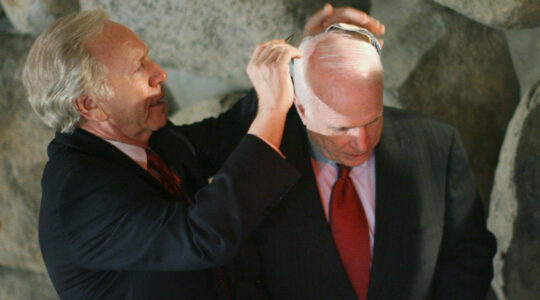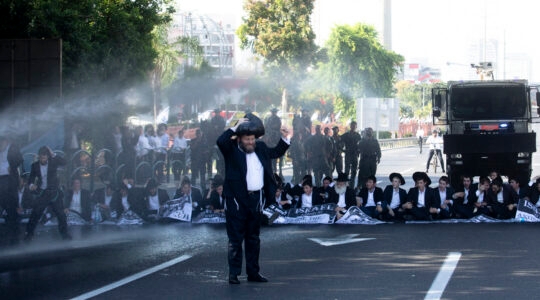Police confront a man with compromised health status who resists their demands to comply. In the course of an escalating physical scuffle, the man suffers blows to the chest, but the most dramatic action captured on camera is of an officer grabbing at the man's throat. Shortly after this, the man collapses and dies. Protests and public outrage spread throughout the land.
You'd be right if this scenario reminds you of Eric Garner, who died suddenly in a fatal encounter with New York City police on Staten Island. Yet this also describes, in broad strokes, what happened early this week to Ziad Abu Ein, a minister in the government of the Palestinian Authority and the head of the “Anti-Wall and Settlement Commission.”
Mr. Garner had asthma and other conditions associated with obesity. Minister Abu Ein is also understood to have suffered from chronic health problems, including diabetes and high blood pressure. Israelis believe he died of a heart attack, brought on during the course of a non-violent demonstration against the expansion of Adei Ad. A West Bank settlement, Adei Ad sits near the Palestinian administrative capital of Ramallah, and the demonstration resulted in an angry confrontation with Israeli Border Police.
Abu Ein “died after being severely beaten by Israeli forces,” claims PLO spokesperson Hanan Ashrawi in a press release from her Ramallah office. And, she continued, after “suffering from tear gas inhalation during a non-violent activity where Palestinians were planting olive trees in Turmus’ayya.”
An article in The Daily Beast describes the Palestinian's demise as follows: “Sources who were at the protest say that Abu Ein suffered a strong head-butt from a helmet-wearing Israeli soldier, was hit in the chest, and inhaled a large amount of teargas. … One video shows Abu Ein getting his throat grabbed by a soldier during an argument, followed by a tear gas canister exploding next to them.”
It can be assumed that in the case of Abu Ein, as with Garner, death was neither intended nor expected. Still, as loud as the tumult has been in New York and elsewhere concerning Garner, Michael Brown and other recent victims of American police violence, the eventual cost of Abu Ein's passing may weigh far heavier on Israelis and Palestinians.
Tensions were already sky high as a result of the recent Gaza war, the breakdown of peace negotiations, the seemingly unabated expansion of construction for Jews in the West Bank and East Jerusalem and provocative statements by some politicians and Jewish religious radicals regarding the Temple Mount/Noble Sanctuary complex.
Ominously, Saeb Erekat, the PLO's chief negotiator with Israel, and Palestinian Authority official, Jibril Rajoub, have both announced a halt in the PA's security coordination with Israel. Israeli and US security officials have long agreed on the value of this relationship with their Palestinian counterparts in countering terror. With new clashes reported with the IDF in al-Bireh in the West Bank following Abu Ein's funeral, we have to wonder if Israel and the Palestinians are returning to the bad old days of an intifada.
Ralph Seliger is a long-time editor and writer, mostly on Israeli and Jewish political and cultural issues, from a left-Zionist perspective. He is currently administrator of the Partners for Progressive Israel Blog.




